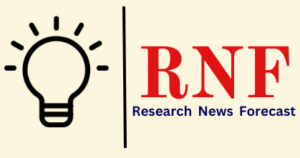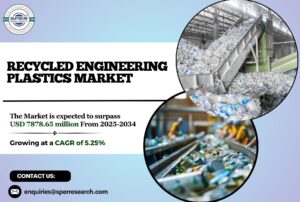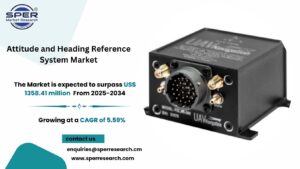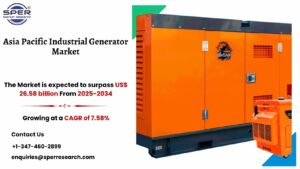Honeycomb Core Materials Market Growth 2023- Global Industry Share, Revenue, Upcoming Trends, CAGR Status, Business Challenges and Future Competition Till 2033: SPER Market Research
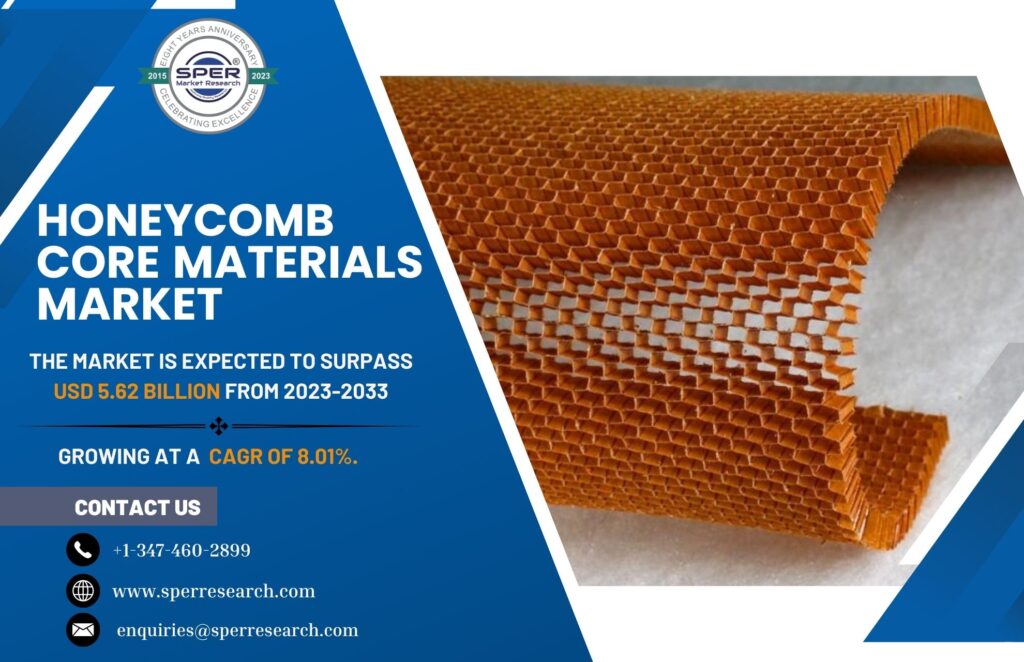
The honeycomb core is utilised to make composite sandwich structures. It provides rigidity to the composite construction with negligible weight gain. This core material provides a firm separation between the skins and distributes shear forces caused by out-of-plane loads over a wider surface area. It provides electromagnetic shielding, thermal insulation, and sound absorption, among other benefits. To make honeycomb cores, a huge number of hexagon-shaped cells are assembled into a honeycomb structure.
According to SPER market research, ‘Honeycomb Core Materials Market Size- By Type, By End Use Industry – Regional Outlook, Competitive Strategies and Segment Forecast to 2033’ state that the Honeycomb Core Materials Market is predicted to reach USD 5.62 billion by 2033 with a CAGR of 8.01%.
There are various factors that anticipated to propel hexagonal demand in the business such as the expanding market for honeycomb core materials and the growing use of aluminium and paper as solutions. Increased demand for paper, aramid fibre, and aluminium in end-user marine and transportation applications is driving market growth even further. The expanding market for lightweight, fuel-efficient automobiles is also propelling the development of innovative materials with lightweight, high strength properties. Among the many applications for the substance are diffusers, spoilers, flooring, interior body panels, and chassis components. Furthermore, growing demand from Boeing and Airbus, as well as significant commercial advancements, are likely to propel the global market for honeycomb core materials’ rise. The market is constrained by the honeycomb’s ability to absorb moisture and humidity as well as the structural limits of the materials used in the honeycomb core. Honeycomb core materials’ recyclable and environmentally beneficial qualities complement the growing emphasis on sustainable practises, making them more appealing to consumers.
The primary drawback of materials used in honeycomb cores is their high price. The product’s excessively high cost as a result restricts its broad acceptance across end-use sectors. Furthermore, moisture absorption by honeycomb’s open cell designs, structural limitations of honeycomb core materials, and stress corrosion cracking of aluminium honeycomb cores in extremely corrosive environments are all potential barriers to commercial adoption. In any case, using recyclable materials.
Request For Free Sample Report @ https://www.sperresearch.com/report-store/honeycomb-core-materials-market.aspx?sample=1
Impact of COVID-19 on Honeycomb Core Materials Market
Furthermore, the demand for materials used in honeycomb cores was greatly affected by the COVID-19 pandemic. The aerospace sector, a significant user of honeycomb cores, experienced a decline in demand for aeroplanes and other parts as a result of pervasive travel restrictions. The use of honeycomb in lightweight panels was also impacted by the slowdown in commercial projects in the construction industry. The need for honeycomb cores in healthcare facilities for the fabrication of ventilators and medical equipment has surged, offsetting some of the losses caused by the epidemic.
Honeycomb Core Materials Market Key Players:
Geographically, Asia Pacific led the global Honeycomb core market in terms of value. China and India is the biggest market in the Asia-Pacific area. The growth of the APAC packaging industry is directly driving the market for honeycomb core materials. Additionally, some of the market key players are Fabrinox, Argosy International, Schtz GmbH & Co. KGaA, TCCORE APPLIED HONEYCOMB TECHNOLOGY CO., LTD., The Gill Corporation.
Honeycomb Core Materials Market Segmentation:
The SPER Market Research report seeks to give market dynamics, demand, and supply forecast for the years up to 2033. This report contains statistics on product type segment growth estimates and forecasts.
By Type: Based on the Type, Global Honeycomb Core Materials Market is segmented as; Aluminium Core, Aramid Core, Paper, Thermoplastics, Others.
By End Use Industry: Based on the End Use Industry, Global Honeycomb Core Materials Market is segmented as; Packaging, Aerospace and Defense, Construction and Infrastructure, Automotive, Others.
By Region: This research also includes data for North America, Asia-Pacific, Latin America, Middle East & Africa and Europe.
This study also encompasses various drivers and restraining factors of this market for the forecast period. Various growth opportunities are also discussed in the report
For More Information, refer to below link:-
Honeycomb Core Materials Market Future Outlook
Related Reports:
Follow Us –
LinkedIn | Instagram | Facebook | Twitter
Contact Us:
Sara Lopes, Business Consultant – U.S.A.
SPER Market Research
